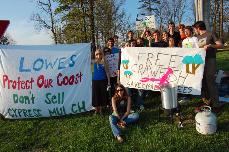The corporate headquarters of Lowe’s Home Improvement stands outside of Mooresville, N.C. like a series of stark beige boxes when viewed from the distance. With its lengthy one lane drive, helipad, and guard booths standing sentry over the main entrance, the place has an air of invulnerability.On April 9, the Save Our Cypress Coalition and student activists from UNC-Charlotte and Guilford traveled to the corner of Lowe’s Boulevard and Fairview Road to protest the company’s usage of unsustainable cypress trees in their mulch products.
The cypress stands of Louisiana and the Gulf Coast serve as a vital form of protection against storm erosion in addition to housing a diverse array of flora and fauna. Incapable of returning to their original density after being cut down, cypress forests are being lost at an alarming rate. Fueled by these anxieties of continual coastal erosion, swamp destruction, and the potential loss of more human life due increasingly unmitigated flooding, the protesters paraded about the intersection.
But rather than charge the gates in an effort to butt heads with the bureaucracy, Save Our Cypress Coalition campaign organizer Dan Favre had another plan in mind. Armed with a cardboard box stuffed with over 10,000 letters of petition representing the voices of everyone from “suburban gardeners to young concert-goers” asking Lowe’s to stop supporting the destructive cypress logging industry, Favre merely wanted to make a delivery.
Curiously enough, Lowe’s was not accepting mail that day.
“We promised the people that these petitions would be hand-delivered, not left at a gate,” said Favre calmly after being refused entry by a man in a booth. A few phone calls later, he was not any closer to getting inside so he resolved to send the letters through the mail instead.
“I just really wanted to drop those petitions off in person,” said Favre, wheeling the car around to join the rest of the protesters. “They represent hundreds and hundreds of hours of volunteer time.”
Meanwhile, back at the corner, the atmosphere was a mixture of political indignation tempered with Cheerwine and late afternoon silliness. After throwing a batch of live crawfish into a propane fueled pressure cooker, Favre was ready to talk again. He explained how a year and a half ago Save Our Cypress called on Home Depot, Lowe’s, and Wal-Mart to stop selling cypress mulch. So far, only Wal-Mart has fully complied with the request.
“Lowe’s is completely at odds with its own corporate environmental sustainability policies by continuing to sell this destructive product,” Favre said. “It seems they are more interested in embracing the expanding mulch market.”
“Lowe’s talks a big game about protecting the planet’s forests, but they’re not living up to the hype,” said John Avery, president of the Earth Club at UNC-Charlotte in a press release. “They have the opportunity to be an environmental leader by simply making the switch to sustainable alternatives.”
And the sustainable alternatives are all too abundant. While some of them can be obtained from farms, such as pine mulch and straw, others, like the invasive melaleuca shrub, are dangerous to habitats and need to be controlled anyway. So why is cypress ending up in flowerbeds?
“It’s a choice based on aesthetics, but also on a lot of myths that suggest that cypress doesn’t float or is susceptible to insect and water damage,” Favre said. “But the truth is it’s not really any better than what else is available.”
According to Favre, Lowe’s has formally acknowledged to the Save Our Cypress Coalition the urgency of stopping cypress deforestation. However, their concerns have only extended to a limited area of southeastern Louisiana, leaving out other places where the cypress mulch industry is hard at work.
“It’s nice that Lowe’s, and to a greater extent Wal-Mart, have recognized our concerns about cypress in Louisiana, but with no transparency in the supply chain, they can’t be sure where their mulch is sourced. And, what about the other states with cypress, like Florida and North Carolina?” said Guilford senior Josh Lewis in a press release. “Pushing cypress mulch production to other areas and destroying flood protection and important wildlife there is not a real solution.”
Overall, the participants felt that the protest was successful.
“I found it funny and ironic that most of the people driving past us were probably employees of Lowe’s,” said sophomore Aaron Woerner. “Who knows, maybe we taught them something new about their company.”
“I leafleted the hell out of some leaflets, and I had a good time,” said senior Will Mckindley-Ward. “But I wasn’t protesting just because it made me feel good, I went because it seemed practical.

